
by John Boston
Melting Down
The cover of the May 1964 Amazing depicts an astronaut whose space helmet and surrounding objects are melting as the giant sun blazes in through his rather large porthole. This illustrates Lester del Rey’s story Boiling Point, or more likely the story rationalizes the cover; I suspect more strongly each month that a lot of Amazing’s cover stories are in fact written around an already purchased cover painting.
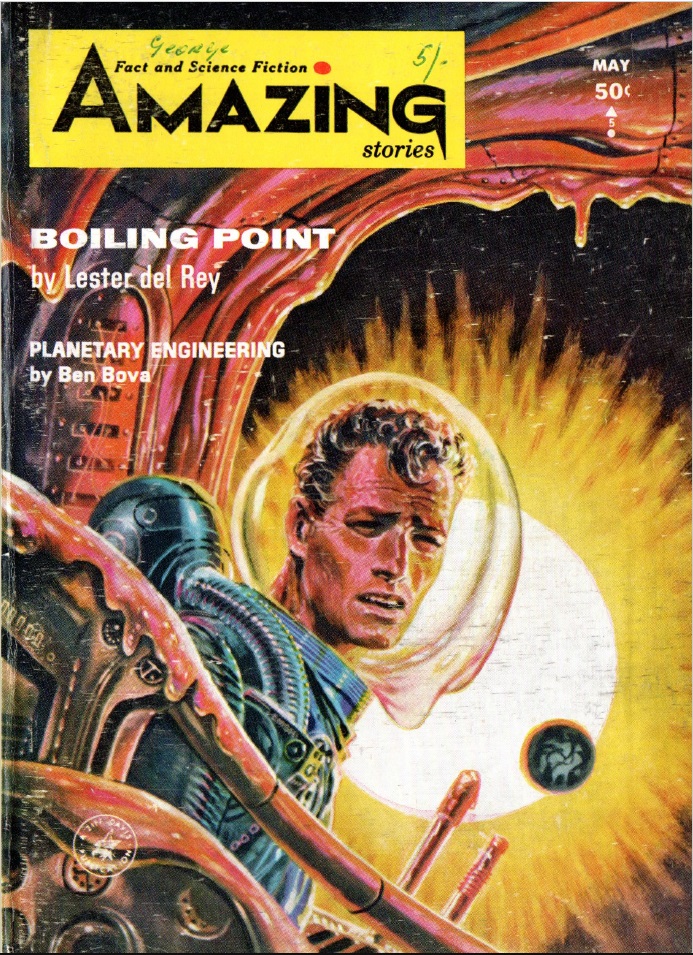
by Schelling
Boiling Point
The story starts out as routinely clever. Protagonist Stasek is a technician residing on Venus and studying “energy-eaters,” amorphous creatures who hang out near the sun and live on its energy. He is pressed into service to do maintenance on“the ring of satellites strung like beads between the orbit of Venus and the orbit of Mercury.” They are there to relay communications, observe sunspots, absorb energy and beam it to wherever it’s needed.
Stasek sets out and, of course, quickly comes across an energy-eater wrapped around a satellite he’s supposed to service. What an opportunity! He disregards regulations, gets close to it, and finds out why nobody who has done so has come back: it wraps itself around his little spaceship. Turns out it’s telepathic, and it’s hungry: it wants to go towards the sun, and when Stasek demurs, it takes control of the ship. Curtains! Except Stasek, before he cooks completely, figures out a better deal to offer it.
This would be a perfectly acceptable piece of hardware-opera yard goods except that it turns on the assumption that telepathic communication, if it exists at all, could work right off the bat between creatures of such utterly different background and experience. I read that some guy named Wittgenstein said, “If a lion could speak, we could not understand him.” Sounds right to me, and that goes at least double for a shape-shifting vacuum-dweller that feeds on pure energy. Sorry, too much to swallow, downgraded from yard goods to factory reject. Two stars.
As for the rest of the issue, I can’t say there’s anything especially good here—but at least some of it is bad in more interesting ways than usual. Also, as someone suggested to me, this seems to be the Special Bad-Mouthing Issue. Once past the del Rey story, every piece of fiction contains some derogatory stereotype or a character who is nasty to the point of caricature.

by Schelling
This issue concludes Phyllis Gotlieb’s serial Sunburst, which seems sincere and well-meaning, but ultimately inconclusive.
Premise (in case you haven't been reading along): years ago, in a small Midwestern city called Sorrel Park, a nuclear reactor accident resulted in the town’s being quarantined under martial law, and in the birth of a number of mutant children with very strong psionic powers. A few years later these feral superchildren ran rampant through the town destroying everything within reach, and were themselves quarantined behind a force field in a barren place called the Dump (hence, Dumplings).
The main character is Shandy Johnson, a 13-year-old orphaned girl who is an “imperv,” i.e., someone with no psi talent who is undetectable via psi, and who is trying to get by in depressed and police-dominated Sorrel Park. She is apprehended and taken to the authorities, who want to use her as a go-between with the Dumplings, though that doesn’t actually happen.
Instead the author launches a very busy plot full of escapes, pursuits, disappearances, captivities, disturbances, threats of massive sabotage of essential government functions, etc. Midway through, Shandy unspools her big idea: psi talents tend to develop in people who are psychopaths anyway—born juvenile delinquents! I.e., mesomorphs who have had trouble with the police starting early, who mostly “come from families without very strong morals—often immigrants who have trouble coping with a new country. . . . I’ve heard poverty is a cause of delinquency, but I think these kinds of shiftless, helpless people could be a cause of poverty too. . . .”
After this detour into discredited pseudo-science, the busy plot machine cranks up again, with the Dumplings mostly acting like the natural-born delinquents we’ve been told they are, and at the end most of those who are still alive are back in the Dump behind a more secure force field. That is, after all the hugger-mugger, the story’s basic problem, young people essentially sentenced to life imprisonment in a barren environment because nobody can control their dangerous talents, is unchanged. It is suggested that Shandy is the real mutant superperson here, though what that means is unclear.
Meanwhile, we have never seen the Dumplings and their outcast society—the most interesting part of the set-up—except second-hand, and in melodramatic bursts during their breakout. It’s all perfectly readable, if you can overlook Gotlieb’s frequently clumsy writing. (Sample: “She had come to a hard decision, and she silently awarded herself the razz for her sense of its altruism, without stopping the ache.”) It just never adds up to much despite the potentially interesting premise. Two stars.
The Crime and the Glory of Commander Suzdal
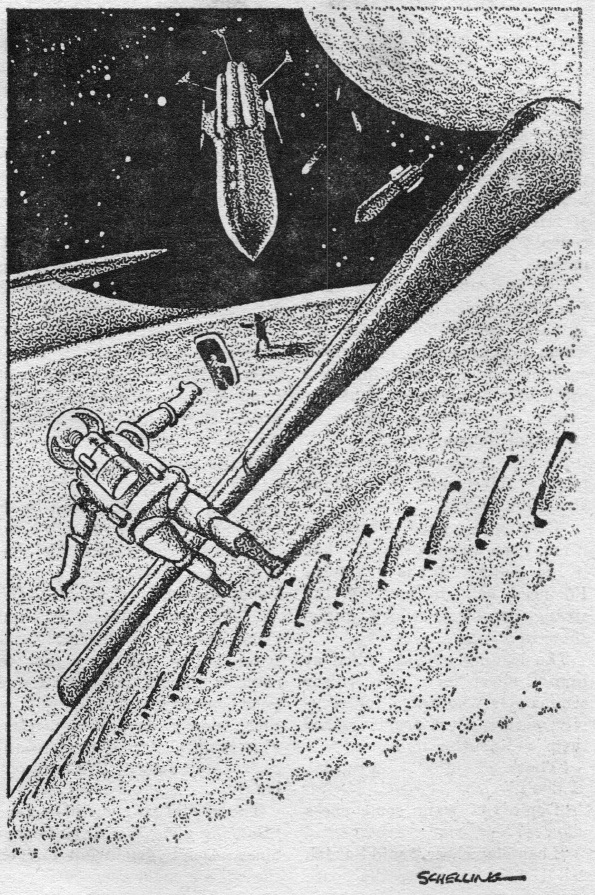
by Schelling
Next up is The Crime and the Glory of Commander Suzdal, by Cordwainer Smith, he of the suddenly soaring reputation. This one is told in high whimsical tall-tale style, about the eponymous Commander who is dispatched to probe the “outer reaches of our galaxy.” He encounters a colony planet where “femininity became carcinogenic,” so the women all died off and the only means of survival was to turn everyone medically into men, which of course had effects beyond the medical. Smith describes the results at some length. Here’s a sample:
“They, themselves, were bearded homosexuals, with rouged lips, ornate earrings, fine heads of hair, and very few old men among them. They killed off their men before they became old; the things they could not get from love or relaxation or comfort, they purchased with battle and death. They made up songs proclaiming themselves to be the last of the old men and the first of the new, and they sang their hate to mankind when they should meet, and they sang ‘Woe is earth that we should find it,’ and yet something inside them made them add to almost every song a refrain which troubled even them.
“And I mourn Man!”
One must ask whether this is a glimpse of the far future, or of the author’s insecurities. We don’t hear much about homosexuals here in this small Kentucky town, and what we do hear amounts to locker room talk. I wonder if Smith is just passing on the locker room talk of intellectuals. His extravagant fantasy about people I doubt he knows much about reminds me of some of the strange things people in this mostly segregated town say about Negroes. Anyway, two stars: a story that started out like a bravura performance, brought down by what reads like gross stereotyping.
Incidentally, the blurb to the story reads like the editor tried to get into the swing of Smith’s sometimes outlandish prose. I wonder if she just appropriated a piece of the story to serve as a blurb.
The Artist
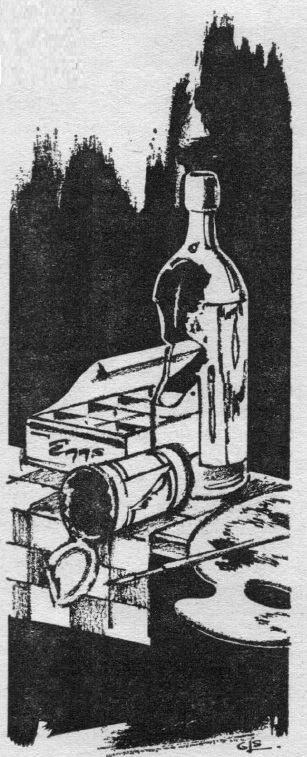
by Schelling
Rosel George Brown contributes The Artist, a purposefully difficult and unpleasant story about an artist, a stupid and nasty jerk who has become successful by painting what his long-suffering wife sees (it’s not too clear how that works). Now she sees something strange and frightening in a corner of the room, and rather than have him paint what she sees, she provokes him into getting a stepladder and looking for himself, with unpleasant results (for him anyway). It’s sort of like that playwright of bad marriages, Edward Albee, meeting H.P. Lovecraft, to mutual dislike. For lagniappe, the action takes place at a party featuring caricatured secondary characters. Two stars for making the story seem interesting enough to persevere with it (including a second read) long enough to figure out what is going on.
According to His Abilities

by Schelling
Another nasty jerk is featured in Harry Harrison’s According to His Abilities, though this one isn’t so stupid, and is also rationalized at the end of the story. The refined milquetoast DeWitt and the boorish thug Briggs have been dispatched to rescue an Earthman from primitive aliens who are pretty boorish and thuggy themselves. Briggs’s belligerence wins the day, and there’s a facile revelation about him at the end, of an all too familiar sort. It’s dreary hackwork executed professionally. Two stars.
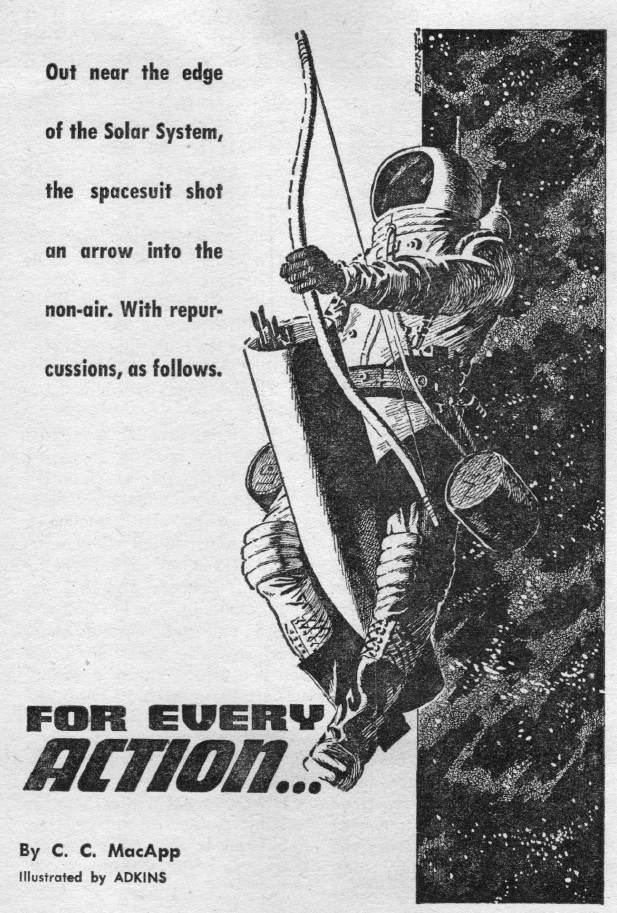
by Adkins
C.C. MacApp’s For Every Action starts with a mildly clever idea, spaceborne life forms around the orbit of Pluto that glom on to spaceships’ rocket exhausts so they can no longer steer accurately, then adds another such idea (a guy could move around in space using a bow and arrow!), and sets them in a silly frame of Cold War suspicion, concluding with a reference to Soviet spacemen (implicitly, drunk) floating in space singing Volga Boat Song (sic). It’s generically similar to Boiling Point but much weaker. Two stars, barely.
Planetary Engineering
And of course Ben Bova is back with the latest in his interminable series of fact articles though this one gets no farther than the Moon. It’s about what people will have to do to establish colonies there, and is frankly a rehash of what we’ve seen not only in dozens of SF stories but in plenty of articles in general-interest magazines, complete with platitudes (“Finally, carving out a human settlement in a literally new world will give man an opportunity to create a new society.” Etc.) and observations so mundane as to be suffocating (“Corridors will no doubt be painted in special color codes, to help travellers find their way.”). Two stars, largely for good intentions. Also, no one is insulted here.
The Verdict
So: not much here of much merit, but, as already suggested . . . if you can’t be good, at least find an interesting way to be bad.
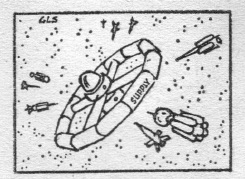
by Schelling
[Come join us at Portal 55, Galactic Journey's real-time lounge! Talk about your favorite SFF, chat with the Traveler and co., relax, sit a spell…]

![[April 14, 1964] COOKING WITH ASH (the May 1964 <i>Amazing</i>)](https://galacticjourney.org/wp-content/uploads/2019/04/640414cover-672x372.jpg)
